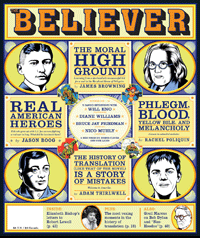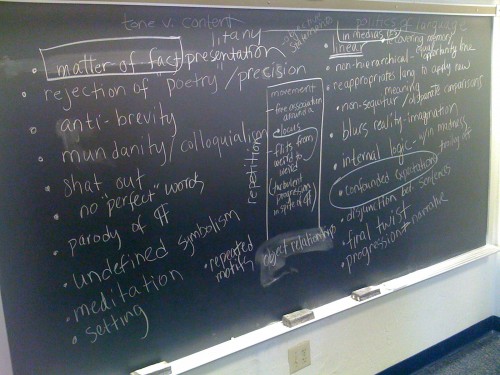I Helped Girls Write Now and You Can Too
 Do you people know about Significant Objects, the ebay-based web-journal that raises money for worthy causes by getting writers to write flash fiction about the random items they put up for auction? If not, why not? Blake told you about this a month ago! Anyway, at present SO is in a five-part partnership with The Believer, and yours truly is one of the writers who was asked to write an original piece of flash-fic re a SIGNIFICANT OBJECT, in this case a pair of metal flowers (see left). You can read my story, and bid on the FLOWERS OF INSPIRATION here. You can also see the complete history of the experiment, with tons of data, including sales rankings, here. I hope you will consider bidding on the metal flowers, to help raise money for GIRLS WRITE NOW, which is a very fantastic organization that does this:
Do you people know about Significant Objects, the ebay-based web-journal that raises money for worthy causes by getting writers to write flash fiction about the random items they put up for auction? If not, why not? Blake told you about this a month ago! Anyway, at present SO is in a five-part partnership with The Believer, and yours truly is one of the writers who was asked to write an original piece of flash-fic re a SIGNIFICANT OBJECT, in this case a pair of metal flowers (see left). You can read my story, and bid on the FLOWERS OF INSPIRATION here. You can also see the complete history of the experiment, with tons of data, including sales rankings, here. I hope you will consider bidding on the metal flowers, to help raise money for GIRLS WRITE NOW, which is a very fantastic organization that does this:
Girls Write Now provide guidance, support, and opportunities for New York City’s underserved or at-risk high school girls, enabling them to develop their creative, independent voices, explore careers in professional writing, and learn how to make healthy choices in school, career, and life.
To potentially sweeten this deal, I’m offering the winning bidder a copy of my story collection. AND, if that bid is over $76 (the Doty-Lethem Threshold), I will go all-out CARE PACKAGE on you, and also include copies of The Agriculture Reader #3, the so-new-it’s-not-on-our-website-yet (though it might be by the time you win this auction) Agriculture Reader #4, plus something else that I don’t know what it is yet–maybe a McSweeney’s #24 if I have any of those left, or something else cool if I don’t. So okay, head on over there and raise these girls some money. And hey, while you’re at it, check out the incredible wealth of short-shorts in the SO archive. Start with Padgett Powell on a Mickey Mouse nametag, maybe; onward to Jenny Offill on a miniature turkey dinner; then how about Pulitzer Prize finalist Lydia Millet and her chili cat? The list is nearly endless, as is the joy.
The Middle Path
 Robert Cohen has a new piece worth reading called “Going to the Tigers: Notes on Middle Style” now up at The Believer.
Robert Cohen has a new piece worth reading called “Going to the Tigers: Notes on Middle Style” now up at The Believer.
Ultimately, I disagree with Cohen because to my mind he’s implicitly recuperating the old Aristotelian virtues we know so well from Book II of the Nicomachean Ethics, in order to illustrate his point about the value of avoiding both excess and deficiency. What seals my disagreement is this statement:
Reading a novel that feels overly finessed, not quite visceral, makes us antsy and peevish. Enough with the light show, we think, enough with the incense, the dry ice, the elaborate riddles and evasions. No wonder people hate novels.
For one thing, I disagree with his use of first person plural. It makes “us” antsy? “We” think? Really? You’re gonna make a claim that you know what reading an overly finessed, not quite visceral novel makes me feel? That’s bonkers. And point of fact, I almost exclusively (and purposefully) read works that strive for light shows, incense, dry ice, elaborate riddles and evasions. I’m being serious. That’s why I attend to literature: for the spectacle.
But before I skin my tongue, I’ll leave it there. Take a gander. Seems like something that might/could spark some conversation.
February 3rd, 2010 / 11:34 pm
Animal Instincts: Destroying the Cult of Reason
“One major lesson I had to learn was to become empty and dumb and trusting enough to write every day. For this I needed, at times, blind patience, no theories about art.” –Larry Levis
Thinking about the intangibles of writing is like walking around, drunk, in a pitch-black room the size of an airplane hangar, with ghosts, with disembodied voices, with naked doppelgangers, choking on the fear of bumping into something much larger, much hairier than yourself.
I believe that’s why we talk about craft, the building blocks of a piece of art—light, shadow, line break, sentence. These are necessary to the physical architecture of the thing, certainly, and they’re quantifiable. Humans, we, desire formula and quantitative resources, names and registers. These are easier than dark, open spaces.
But what about the intangibles, the anti-craft, anti-move, anti-self-consciousness of making? What about the inexplicable creates lasting art, something more than pop culture referentiality, more than tricks-of-a-trade? What a friend of mine calls irreducibility?
Many poets and artists have tried to define the “it” factor. Many, to my eye, have succeeded in some way but never in a flesh-and-blood way. Never in a follow-these-eight-easy-steps way. For that, I’m glad.
Garcia Lorca had his duende, hovering at the lip of the wound; Ginsberg said, “the only poetic tradition is the voice out of the burning bush.” Keats sought the capability “of being in uncertainties, Mysteries, doubts without any irritable reaching after fact & reason.” I could go on forever, maybe.
There’s an interview with Aline Kominsky-Crumb in the Nov/Dec 2009 issue of The Believer. In it, Kominsky-Crumb describes a similar abstract quality to her comic-making:
“I’m so emotionally charged when I’m doing that, I can’t really control what comes out. It just comes out in a very direct form. In a way, I’m lucky that I can access that. In another way it’s horrible because I can’t refine it or improve it and make it look more, like, acceptable.”
Craft is a given, right? You love an art form so you study it; you dissect its structure. You practice, you imitate. You count syllables, maybe. You look at possible moves, maybe. Sometimes you go to school to understand and synthesize the great traditions in the company of other humans so you don’t have to read poems to your dog all the time. Sometimes you benefit from school. Sometimes you are ruined and reborn [see the Kominsky-Crumb interview for more on that].
But then what? Inevitably, you ask yourself, why does this poem make my heart sing? Why do I feel like I could jump off a building after I read this book? Or, like Dickinson, why does this thing make me feel physically like the top of my head has been taken off?
Jim Ruland wrote a great open letter to Matthew Simmons about A Jello Horse at The Believer. It starts:
Dear Matthew Simmons,
I am writing today to ask you a question about your book, which I read with great pleasure: what is it?
Concerning the Spiritual in Indie Rock
 I often forget that The Believer publishes some original content online, mostly because pieces don’t appear there very often, or on any particular schedule (at least, not one that’s apparent to me). But today is a glad day, for I have been to Believermag.com and I have found there Judy Berman’s online exclusive “Concerning the Spiritual in Indie Rock.” It’s a great, smart article, and does double duty as the blueprint for a pretty kickass playlist. Berman starts with Kandinsky’s essay “Concerning the Spiritual in Art” (published in 1911, which was the year after, according to Virginia Woolf, “human character changed”) and then takes a hard jump forward to Neutral Milk Hotel’s 1998 album, In the Aeroplane Over the Sea. Onward then to Arcade Fire, Gowns, Dan Deacon, the new Animal Collective single “My Girls,” the idea of worship and praise as unfixed experiences, and the idea of drone music as a successor/re-incarnation of certain kinds of meditation. But my favorite part of the piece is about the band Ponytail (pictured above), because I saw these guys open for Mission of Burma right before I went out of the country in July, and let me tell you, everything Berman says about them is right-on.
I often forget that The Believer publishes some original content online, mostly because pieces don’t appear there very often, or on any particular schedule (at least, not one that’s apparent to me). But today is a glad day, for I have been to Believermag.com and I have found there Judy Berman’s online exclusive “Concerning the Spiritual in Indie Rock.” It’s a great, smart article, and does double duty as the blueprint for a pretty kickass playlist. Berman starts with Kandinsky’s essay “Concerning the Spiritual in Art” (published in 1911, which was the year after, according to Virginia Woolf, “human character changed”) and then takes a hard jump forward to Neutral Milk Hotel’s 1998 album, In the Aeroplane Over the Sea. Onward then to Arcade Fire, Gowns, Dan Deacon, the new Animal Collective single “My Girls,” the idea of worship and praise as unfixed experiences, and the idea of drone music as a successor/re-incarnation of certain kinds of meditation. But my favorite part of the piece is about the band Ponytail (pictured above), because I saw these guys open for Mission of Burma right before I went out of the country in July, and let me tell you, everything Berman says about them is right-on.
The title of Ponytail’s most recent album, Ice Cream Spiritual (2008), perfectly captures the band’s sugar-high, wonder-stricken noise-punk. Singer Molly Siegel’s high-pitched shrieks and her bandmates’ wild, experimental take on the classic guitar-bass-drum combination recall nothing more than childhood playtime. For Siegel, childhood and spirituality are about both exploding boundaries between ourselves and the universe and the “ecstasy in losing yourself” that creates.
Be sure to check out the rest of the Believer online exclusives, which includes Stephen Elliott interviewing Matt Bai, two music pieces by Matt Derby, and Chloe Veltman’s classic “The Passion of the Morrissey.”
PS- I’ll be in Tokyo till Tuesday so I won’t be around. Don’t have too much fun without me.
Online Lit Spotlight in the Believer Oct 08
 There’s a new issue of the Believer out for October, and while the magazine is always a great read, this month is particularly good for two sects of people: those who like Gordon Lish, and fans of online lit.
There’s a new issue of the Believer out for October, and while the magazine is always a great read, this month is particularly good for two sects of people: those who like Gordon Lish, and fans of online lit.
I’m not sure if it was an editorial schematic or chance, but there’s more Lish related stuff in this issue than seems coincidental: an interview with Diane Williams by Kevin Sampsell, an interview with Will Eno by Patricia Mulgraw, a review of David Ohle’s The Pisstown Chaos by Benjamin Strong, and a review of Normal Lock’s Grim Tales, by, well, me.
Of course you could probably take just about any literary magazine with big names in it and somehow Kevin Bacon it right back to Lish, but this one seems most close to home.
On the online lit side, I am excited about my Lock review mainly because it’s primarily an eBook that I reviewed, published online by Elimae and readable here, and also because I got to talk about other online lit sites and eBooks in as awesome a spot as the Believer. The review is also replicated in full online and you can read it here.
October 1st, 2008 / 1:31 pm


